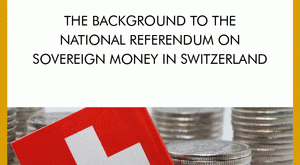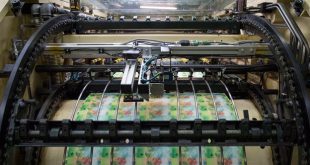Wer sich intensiv mit der fachlichen Materie „Vollgeld-Initiative“ auseinandergesetzt hat, kann aufatmen. Wäre diese Initiative angenommen worden, hätte deren Umsetzung unser Land in ein wirtschaftliches und politisches Chaos gestürzt. Es hätte nur zwei Möglichkeiten gegeben: entweder die Initiative einfach ignorieren und nicht umsetzen (wie das in unserem Land mehr und mehr in Mode kommt) oder sie nachträglich für...
Read More »SNB Statement on the outcome of the popular vote of 10 June 2018
The Swiss National Bank (SNB) has acknowledged the outcome of the popular vote on the sovereign money initiative. The SNB has a constitutional and statutory mandate to pursue a monetary policy serving the interests of the country as a whole. It is charged with ensuring price stability while taking due account of economic developments. The adoption of the sovereign money initiative would have made it considerably more...
Read More »“Vollgeld – Was spricht dagegen? (Sovereign Money—What are the Problems?),” RABE, 2018
Radio Bern RaBe, May 15, 2018. HTML with link to podcast (interview starts at 08:15). Interview with Radio Bern RaBe about Vollgeld and the Vollgeld initiative.
Read More »“Was Vollgeld bringt – und was nicht (Sovereign Money—Pluses and Minuses),” SRF, 2018
[embedded content] Wer soll Franken herstellen dürfen? Nur die Schweizerische Nationalbank, oder auch die Geschäftsbanken wie UBS, CS oder die Kantonalbanken? Ginge es nach der Vollgeld-Initiative, über die wir am 10. Juni abstimmen, wäre künftig klar: Geld als gesetzliches Zahlungsmittel gäbe es nur von der SNB. Offsetmaschine zum Druck von Schweizer Banknoten bei der Schweizerischen Nationalbank. Keystone - Click to...
Read More »“Was Vollgeld bringt – und was nicht (Sovereign Money—Pluses and Minuses),” SRF, 2018
SRF, April 28, 2018. HTML with link to audio file (interview starts at 13:15). Interview with Swiss public radio about Vollgeld and the Vollgeld initiative.
Read More »SNB Rejects Vollgeld and Questions ‘Reserves for All’
In the NZZ, Peter Fischer reports that SNB president Thomas Jordan rejects the Vollgeld initiative and stops short of endorsing the ‘reserves for all’ proposal. … wehrt sich die Nationalbank auch gegen Vorschläge aus akademischen Kreisen, die von der Nationalbank fordern, nicht mehr nur Banken, sondern auch direkt den Schweizer Bürgern elektronisches Zentralbankgeld zur Verfügung zu stellen. Am einfachsten ginge dies,...
Read More »SNB Rejects Vollgeld and Questions ‘Reserves for All’
In the NZZ, Peter Fischer reports that SNB president Thomas Jordan rejects the Vollgeld initiative and stops short of endorsing the ‘reserves for all’ proposal. … wehrt sich die Nationalbank auch gegen Vorschläge aus akademischen Kreisen, die von der Nationalbank fordern, nicht mehr nur Banken, sondern auch direkt den Schweizer Bürgern elektronisches Zentralbankgeld zur Verfügung zu stellen. Am einfachsten ginge dies, wenn jedermann bei der SNB ein Konto halten könnte. Jordan warnt...
Read More »“Geldschöpfung `aus dem Nichts’ (Money from Thin Air),” NZZ, 2017
NZZ, November 16, 2017. PDF. Ökonomenstimme, November 20, 2017. HTML. On money creation. Some misconceptions. Why money is less special than commonly thought.
Read More »On 100%-Equity Financed Banks
On his blog, John Cochrane argues that banks could, and should be 100% equity financed. His points are: (1) There are plenty of safe assets—government debt—out there and banks do not need to “create” additional safe assets—deposits. I share this view partly. First, I don’t know what amount of safe assets are sufficient from a social point of view. Second, I don’t consider government debt to be a safe asset. Third, debt has safety and liquidity properties. The question is not only whether...
Read More »“Kunden sollten zwischen Sichtguthaben und elektronischem Notenbankgeld wählen können (Let People Choose Between Deposits and Reserves),” NZZ, 2017
NZZ, August 17, 2017. HTML, PDF. The Vollgeld initiative may point to a problem but it does not propose a viable solution. Even with Vollgeld, the time consistency friction with its Too-Big-To-Fail implication would persist. A more flexible, liberal approach appears more promising. It would give the general public a choice between holding deposits and reserves. Financial institutions and central banks around the world are pushing in that direction.
Read More » Swiss Economicblogs.org
Swiss Economicblogs.org



